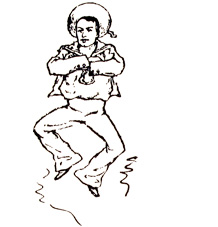H.M.S. Pinafore
The members of the Gilbert & Sullivan Very Light Opera Company have a tremendous respect and appreciation for the works of Gilbert and Sullivan and generally believe that the operettas should be presented as originally written.
As has been noted, however, there are some instances when the Company has considered it appropriate to revise the lyrics, and has done so on a number of occasions, as documented in these Revision website pages.
With the rare exception of modifying a song’s key signature to accommodate a soloist, however, the company has rarely made any change to the music.
A notable exception to this rule occurred during the Company’s 2015 production of H.M.S. Pinafore. Director Lesley Hendrickson moved the operetta from its traditional setting in 1878 to 1942. She felt that H.M.S. Pinafore, as traditionally performed, often seems too frivolous to convey any sense of reality to the operetta’s love stories. Setting the story against the looming backdrop of World War II, however, aboard a ship that might not return from war, immediately lent the love stories a poignancy that they usually lack. The time that Josephine and Ralph, and the Captain and Buttercup, have together during the course of the operetta might be the only time they’ll ever have with each other.
The transition to 1942 was realized in the production’s period appropriate costumes and props, as well as a set wonderfully designed to look like a World War II battleship. The only textual change in the operetta occurred in Sir Joseph’s patter song, in which he sang that he was the Ruler of the “King’s” navy!
The notable musical revision took place at the top of Act II. The Captain entered, carrying a radio. He seated himself and tuned the radio in to the BBC, where he heard a broadcast “at the ballroom of the Savoy Hotel” in which “Arthur Gilbert and his Orchestra” play a swing version of “Fair Moon to Thee I Sing” along with which the Captain sang. At this point, the Company’s own orchestra began playing while the Captain sang the song’s traditional words in a swing setting.
The swing version of “Fair Moon to Thee I Sing” was arranged by Mitchell Adam Johnson and Charlie McCarron.
Cast and audience members alike said how much they enjoyed the swing version of the tune and felt that it lent a delightfully appropriate 1940s atmosphere to the production.
